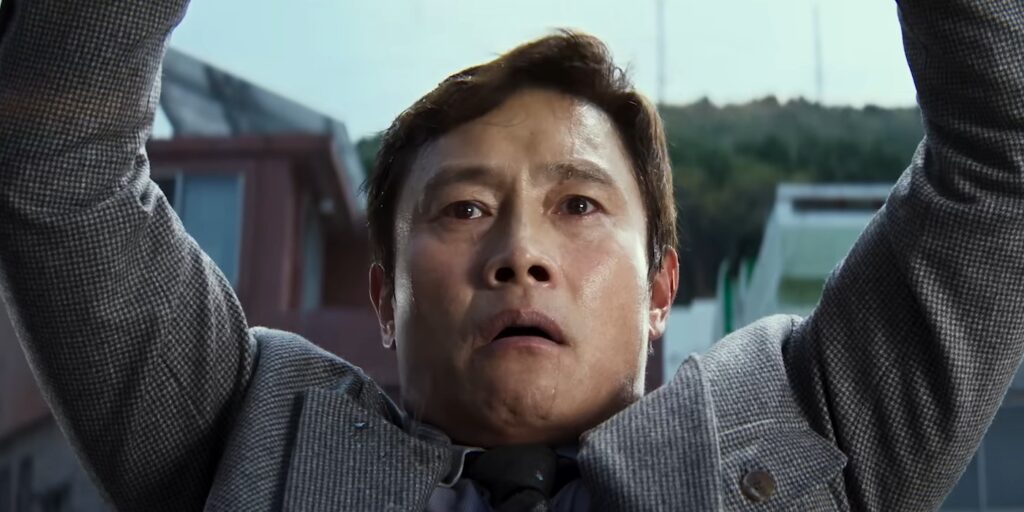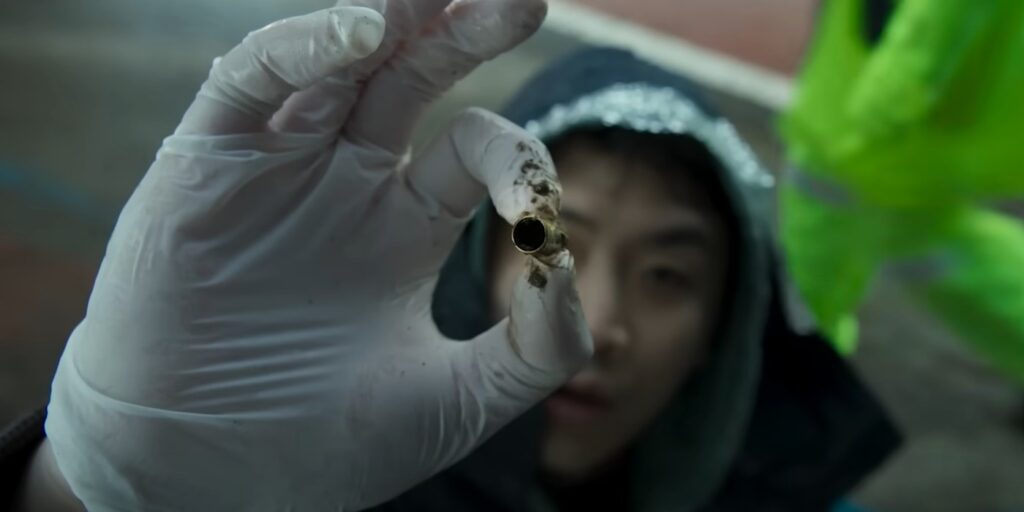To capture the subtle violences of late-stage capitalism, it turns out it takes a director skilled with the portrayal of violence, Park Chan-wook, in his exceptional new outing No Other Choice. We live in one of the worst, and most transparently idiotic, eras in the history of capitalism. Layoff after layoff puts waves of new competitors on the market for any remaining good job. Hundreds of applicants apply, and being considered hinges first on if the posting is real, second on how an algorithm sorts you. If the AI fetishists get their way, the only jobs left will be whoever gets the luxury of shining their sneakers.
Ask any of these decision-makers why they prioritize clearly harmful policies over healthier possibilities, and they’ll answer some version of “we had no other choice.” Leave it to genre titan Park Chan-wook to interrogate that bleak reality in an entertaining (albeit somewhat upsetting) way.
The film centers Man-su (Lee Byung-hun, of Squid Game fame), who after 25 years as a company man for his paper company, has it all. Between his lovely wife Miri (Son Ye-jin), two children (including a daughter who is phenomenal with the cello), and a pair of charming dogs, life is ideal… until he’s abruptly laid off. Now thrust into an uncaring job market, months turn to over a year as Man-su becomes hopeless. An embarrassing interview later leaves him further distraught, until he gets a dark idea: why not eliminate the competition? It’s a decision born of desperation, not sociopathy, leaving Man-su a difficult and tense path forward as he undertakes his deadly plan. The path forward is layered with violence and black comedy, cementing No Other Choice as one of Park Chan-wook’s best films, along with one of the most insightful films of the year.
No Other Choice Underscores Our Modern Capitalist Tragedy With Incisive Comedy
Lee Byung-hun is excellent as the besieged protagonist You Man-su. The role takes a wide range, from hopeless and frantic to intense and eerily cold, and Byung-hun nails it along with top-shelf comedic timing. The key to the role is a degree of audience empathy, as the film’s success relies on audiences caring about Man-su and his situation even if his solution is transparently extreme. Son Ye-jin holds her own as his frustrated, complex wife. There’s a slight air of mystery that underpins everything she does, and the film surely benefits. The pair also share on-screen chemistry that easily pivots between loving and tense, circumstances depending. The supporting players, such as the unfortunate victims of Man-su’s job-market strategy, all give lively performances that elevate the scenes they’re in.

What really makes No Other Choice work is a tight, complex script–one of the best of the year. It’s an extreme situation, but the set-up is decidedly nigh-universal in our era. It captures the overqualified Man-su’s hopelessness: there’s always someone deemed slightly more qualified, and always one too few opportunity to go around. The desperation sells the character’s predatory journey through the job market, his self-talk reminder that he has “no other choice” echoing the justification given by the automators and job-destroyers ruining the paper industry. It’s clear throughout that he gets no enjoyment in the process, though we do watch his moral degradation as he gets bolder, more accustomed, and relishes in his successes and turns of good fortune.
All this, of course, is a setup for pitch-black comedy. Man-su’s path of destruction is laden with little irony and difficulties. He’s a hesitant and unseasoned killer, so his evolution is a tenuous one. The script milks the dark comedy out of each little failure or slight, every irony in the contrast of his decisions against the wider corporate destruction that sets the stage for his choices. The film is tense, but there are ample moments to stop and appreciate the steps his journey takes. He makes murder of the job market, sure, but it’s the hopelessness of the situation that’s ultimately at fault, an irony that’s more relatable than might be desired. Towards the end, his moral compromise spreads to Miri as well, creating tension as she comes to understand what, exactly, Man-su is doing ‘for his family,’ responding to a pressure she had some small hand in.
The Technical Artistry of No Other Choice Amplifies Its Brutality
It’s also worth noting that No Other Choice showcases Park Chan-wook’s technical mastery. It’s a gorgeous film, with beautiful camera movement and clever, gorgeous framing thanks to Kim Woo-hyung. Vibrant colors pop while bleak atmosphere and darkness are elevated, giving a deep realism to the narrative. It’s complemented by Kim Sang-bum’s flawless editing, showcasing some of the year’s most inspired cuts. Certain juxtapositions of You Man-su and Miri’s relative positioning, fades, and precise timing for tension and comedic purposes. The overall narrative feels a little long in specific moments, but the editing shapes an engaging, consistently entertaining story as a whole.

Using irony and walking the thin line between horror and humor has long been proven one of Park Chan-wook’s key aptitudes, but No Other Choice effortlessly flexes that tension to build one of his funniest and best outings. It has a slightly slower pace than one might be used to from his filmography, but the careful pace allows a well-developed tonal balance. It’s also incisive; here, it’s as much about the systemic violences that provoke extreme choices as it is about the choices themselves, a point underscored by our windows into the callous rationalizations of the powers that be. It’s a technical marvel and an incisive look at our modern malaise, through the lens of one wildly extreme story. You’ll never look at Indeed the same again.
No Other Choice was screened at Beyond Fest at American Cinematheque.
For more Reviews, make sure to check back to That Hashtag Show.

![No Other Choice Is A Stunning, Twisted Capitalist Fairytale [Beyond Fest Review]](http://18.211.146.234/wp-content/uploads/2025/09/No-Other-Choice-Review-1280x640.png)
![SUNDANCE 2022: “When You Finish Saving the World” Is An Insufferable Misfire [REVIEW]](http://18.211.146.234/wp-content/uploads/2022/01/when-you-finished-saving-the-word-440x264.png)
![MMPR Green Ranger Legends In 3D Bust From Diamond Select Toys [Review]](http://18.211.146.234/wp-content/uploads/2024/03/green-ranger-440x264.png)

![Zenshu Ep. 4 “ETERNITY”: Immortality Blues [Review]](http://18.211.146.234/wp-content/uploads/2025/01/project_20250130_1124467-01-440x264.png)